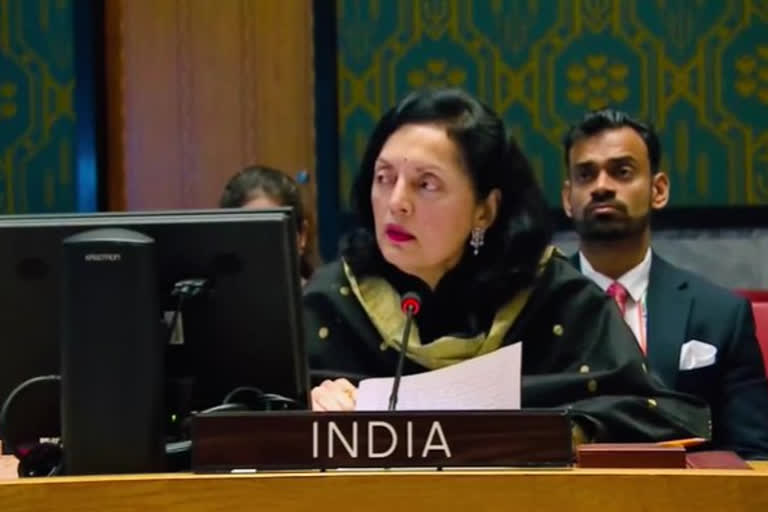United Nations: India will continue to do its best in furthering South-South cooperation which has become even more crucial at a time when developing nations were mostly left to fend for themselves during the COVID-19 pandemic, the country's envoy to the UN Ruchira Kamboj has said. South-South cooperation is a broad framework of collaboration among countries of the South in the political, economic, social, cultural, environmental and technical domains.
Triangular cooperation is collaboration in which traditional donor countries and multilateral organisations facilitate South-South initiatives through the provision of funding, training, management and technological systems as well as other forms of support. South-South and triangular cooperation is one of the important drivers of regional cooperation in Asia and the Pacific and has resulted in increased volumes of South-South trade, foreign direct investment flows and technology transfer.
"South-South and triangular cooperation, we feel very strongly here in India, is the right thing to do multilaterally, working for development is the right thing to do. And this is the small contribution that India with its commitment to multilateralism, and South-South cooperation is venturing to support at the United Nations, Ambassador Kamboj said on Tuesday.
She was speaking at a joint side event hosted by UN Political and Peacebuilding (UN DPPA) and UN Development Programme (UNDP) on South-South and Triangular Cooperation for Peace and Development at the Global South-South Development Expo'. The event showcased concrete South-South and triangular cooperation initiatives in the realm of peace and development implemented by the Global South, with the support of UN DPPA and UNDP.
The event aimed to explore measures to galvanise strategic, coordinated and coherent policy and programmatic support for South-South and triangular cooperation to increase the impact of all UN activities at national, regional and global levels. Kamboj said the COVID pandemic tested the resilience of multilateral institutions and the global South has been largely fending for itself. Realizing that the global South has been mostly left to fend for itself during the pandemic, South-South cooperation has become even more crucial. India is and will continue to do its best in furthering this, she said.
Kamboj highlighted that India has taken the lead in the establishment of the International Solar Alliance and the Coalition for Disaster Resilient Infrastructure that strive to develop and deploy cost-effective and transformational solutions. Noting that at a time when funds for achieving Sustainable Development Goals (SDGs) are getting squeezed or reprioritised to more immediate requirements due to the pandemic, Kamboj said: we need to ensure that funds are utilized to the optimum to achieve the SDGs.
When we seek to build back better from the pandemic, it is crucial that not only should the global South continue to exhibit strong solidarity and share resources, but it is equally important for developed countries to come forward in the same spirit and make sure that we do not slacken our capacity to achieve the Paris Agreement and the 2030 Agenda, she said adding that India walks the talk here.
On COVID-19 vaccines, Kamboj noted that Prime Minister Narendra Modi's call for a One Earth One Health' approach underlines our continuing commitment to the global South, already evident in the supply of more than 240 million vaccine doses to over 100 countries. The motto of the Government of India - together for everyone's growth, with everyone's trust and effort - resonates with the core SDG principle of leaving no one behind, she said.
On peacekeeping, Kamboj said India has a very strong footprint and our strong advocacy of introducing new and advanced technology in peacekeeping missions to overcome security and mandate implementation challenges, particularly needs a mention. In 2021, under India's presidency of the Security Council, and at a cost of USD 1.6 million, India supported the rolling out of the UNITE Aware platform, aimed at enhancing the safety and security of peacekeepers.
Kamboj underscored the importance of the India UN Development Partnership Fund, a "very unique initiative helmed by India in the context of South-South cooperation. Launched in 2017 with a value of USD 150 million, it supports South-owned and South-led sustainable development projects focusing on Least Developed Countries (LDCs), LLDCS (Landlocked Developing Countries) and SIDS (Small Island Developing States).
As part of the COVID response, the India-UN fund has commissioned projects in 15 countries ranging from Trinidad and Tobago and Antigua and Barbuda in the Caribbean to Palau, the Bahamas, to Bolivia and countries like Mali, spanning a broad spectrum of sectors and issues ranging from health, education, drinking water supply, COVID vaccinations, building disaster resilient infrastructure, empowering women, increased capacity building, and creating centers of innovation. (PTI)



